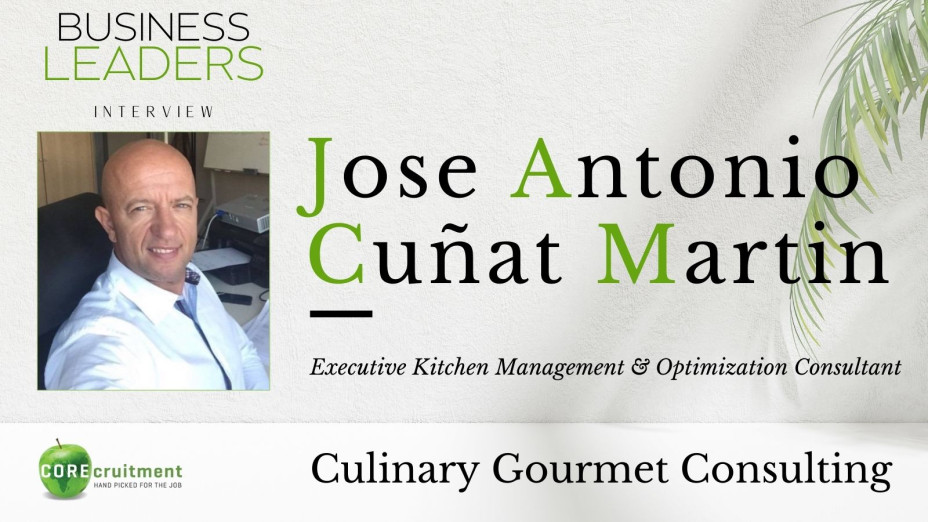Business Leaders interview: Jose Antonio Cunat Martin

Tell us a little about yourself and your business.
My name is Jose Antonio Cuñat Martin, and I have over 25 years of experience in the culinary industry, backed by a diploma and a postgraduate degree in restaurant management from the Basque Country. I specialize in managing restaurant kitchens and optimizing processes in large catering facilities and factories. Culinary Gourmet® 360º offers comprehensive solutions for businesses in the hospitality, restaurant, and catering sectors. We cover all aspects of kitchen operations, starting with the management of supply provisions for manufacturing orders and continuing through the entire production process to the creation of detailed lists of raw material needs. Our goal is to help clients improve productivity, reduce costs, and implement sustainable practices, as well as planning methods through IT, strategic menu design, kitchen layout, and staff training, ensuring that their operations are efficient, competitive, and safe in terms of food safety. The "360º" reflects that our work applies to different areas of kitchen production because: "Our goal is the success of our clients."
What motivates you in your work and what do you find most fulfilling about being a business leader?
What truly motivates me in my work is my passion for culinary arts and the desire to contribute to this exciting sector. I find satisfaction in implementing well-defined work methods, as they not only optimize processes but also foster a more collaborative environment. My interest in research and development (R&D) drives me to continuously learn new techniques and seek improvements. What I value most about being a business leader is the opportunity to apply my knowledge and ensure that everything is done correctly, especially after implementing continuous improvements. Knowing that my work can have a positive impact on the quality and sustainability of the services we provide is a great source of motivation for me.
How did you develop your leadership skills and how would you define your leadership style?
I have developed my leadership skills over more than 25 years in the culinary industry. My training began in Spain, where I learned the traditional importance of hierarchy and communication. However, when I moved to England, I had the opportunity to experience a different and more structured approach. This transition not only allowed me to expand my knowledge but also pushed me to become more autonomous. This combination of styles has been fundamental in shaping my own leadership philosophy.
I consider myself a participative and empathetic leader. I value my team's opinions and believe that involving them in decision-making is essential, as their perspectives enrich the process. Additionally, I strive to be an accessible leader who listens to and supports team members. If the team does not trust what is proposed, success will not reach its full potential, and it is crucial that we work for the common good. For me, being a good leader means not only directing but also conveying and inspiring others to achieve their best selves.
Innovating is crucial in our very diverse industry. How do you stay ahead of trends and incorporate them into your global strategy?
Innovating is crucial in our diverse industry. We stay ahead of trends by observing the difficulties and needs of our clients. Once we identify these areas for improvement, we adapt our know-how and the latest techniques or directions from the larger industry to apply them to each of our clients, taking their specific circumstances into account. This personalized approach allows us not only to meet market demands but also to offer innovative solutions that enhance the efficiency and quality of their operations.
What do you consider to be the key component(s) of effective business operational development?
For effective business operational development, it's essential to have a clear understanding of the business you want to create and why it has strong potential. Planning a comprehensive strategy that covers every phase of the process is key, along with defining necessary actions. Continuous education and staying updated in your field is crucial, as well as clearly defining work plans for each area. Weekly reviews of objective progress and adjusting processes as needed ensures adaptation and improvement, keeping the business aligned with market demands.
How do you approach identifying areas for improvement within a company's operations?
Regularly reviewing the progress of objectives and making necessary adjustments according to the needs of the company is fundamental for continuous improvement. This approach allows us to identify specific areas where operational improvements can be implemented, especially when results do not meet expectations. By measuring and analysing performance regularly, informed decisions can be made to optimize operations at the right time, avoiding unnecessary and prolonged expenses, ensuring that they remain aligned with the changing needs of the business, which effectively supports its evolution.
Where do you think the most promising investments should be focusing on and/or made on?
It is crucial to invest in the project's feasibility study, ensuring that all aspects of the business are clearly defined and accompanied by a concrete action plan. It is also essential to have human resources recruitment that understands the business and its operational functioning, ensuring the hiring of staff with the appropriate level of training and experience. Furthermore, it is important to ensure that the needs for the acquisition of construction and equipment are well-structured and based on solid knowledge of the sector, which is imperative in the foodservice industry. When planning construction, space must be left for future applications of the business, even if they are not immediate. Additionally, the project study should contemplate the possibility of reinventing the business, adapting to the changing needs of the market and customers. This investment in analysis and strategic planning can significantly contribute to maximizing the potential for success and long-term sustainability.
What is or are your biggest career achievement(s)?
One of our greatest professional achievements has been our ability to drive growth and success for our clients in the culinary industry. Through a strategic approach and effective implementation of operational improvements, we have optimized their processes, increasing both productivity and cost savings. Our commitment to excellence is reflected in every project, where our primary goal is the success of our clients. This focus has allowed us to build long-lasting and fruitful relationships in the sector.
Do you have examples where your leadership made a difference? If so, what were they?
One of the most significant projects in my professional career was my involvement in production control and continuous operational improvements, where we managed an average of approximately 9,000 meals per day. This challenge included not only research and development of menus and production methods but also planning operations, purchasing, and creating a triannual budget for all aspects of production, including consumption, maintenance, personnel, and equipment.
The project faced significant annual losses. However, by working closely with the team, we implemented continuous improvements that allowed us to reach the "Break Even Point" within the first 11 months. By the end of that period, we managed to recover 42% of the losses. In that same year, we not only recovered those losses but also closed with a profit of 0.53% compared to the previous year. In summary, we achieved a 42% recovery of losses and a 0.53% profit, highlighting the positive impact of our leadership and collective effort on the project. It was a very challenging process, but the results were truly rewarding.
What’s the most important leadership lesson you’ve learned?
The most important leadership lesson I've learned is that not everything can be done alone. Collaboration and motivation within the team are essential for success. Providing clear directives is crucial, but my direct commitment—being present with the team rather than hidden behind a desk—is key. The team must understand that I recognize and can perform their work, as this builds trust and credibility, ensuring they follow my lead and work effectively together.
How did you identify and seize opportunities for advancement in your career?
I have progressed in my career by taking on new and increasingly challenging roles, which have allowed me to gain essential skills and knowledge. I am always open to training opportunities within my field, keeping myself up to date with the latest trends and techniques. Throughout my career, I have consistently sought out opportunities within companies and the industry at large, taking advantage of every chance to expand my experience in more ambitious projects. Additionally, I have closely followed the evolving needs of the sector since I started in this profession.
Have you achieved everything you wanted in your career so far?
I have managed to build a solid path in my career so far, but there is still much more to learn and improve. This sector is in constant evolution and transformation, especially in hospitality, an area that never stops changing. New trends, technologies, and control methods continuously arise, demanding adaptation to stay at the forefront. Furthermore, we must face the growing demands for sustainability in the current context, adapting to the new circumstances our planet is facing, so I would say there is still a journey ahead of me.
How important is personal development to your success, and how do you approach it?
Personal development is essential for my professional success, as it allows me to continuously improve and adapt to the sector's dynamics. I seek opportunities for ongoing training and value constructive feedback. Additionally, I reflect on my experiences in past projects and the challenges we've overcome to identify areas for improvement, helping me set clear goals and move forward. This mindset of continuous learning is key to further growth and facing new challenges in my career.
How do you prioritise tasks when everything feels like a priority?
When everything seems like a priority, I focus on applying the methods I've learned to structure my tasks. I analyze each activity based on its impact and alignment with project objectives. I use time management tools to prioritize tasks by urgency and importance, helping me identify which activities need immediate attention and which can be scheduled. This approach optimizes my time and ensures that my efforts are directed toward what truly adds value.
What was the hardest decision you have taken as a leader?
While working at a large company, I found myself in the difficult position of restructuring one of my best collaborators. Despite his dedication and effort, the demands of the position exceeded his capabilities. This decision was complicated as it would affect his career, and there were significant issues for the organization at the same time. This experience taught me to balance empathy with the need to make tough decisions for the well-being of the team and the success of the company.
What steps do you take to measure your own performance?
To measure my personal performance, I focus on the group's success. If the team achieves its goals and aligns with the company's objectives and client needs, I know my leadership is effective. I also evaluate key performance indicators, seek constructive feedback from my peers, and review project outcomes. This ongoing reflection helps me adjust my strategies and ensures that we are all moving in the same direction toward success.
What does success mean for you as a business leader?
Success as a business leader means achieving our clients' goals. This involves understanding their needs and delivering effective solutions that not only meet their expectations but also support their growth. By prioritizing client success, we build strong, lasting relationships that ultimately drive our organization's success. Therefore, client satisfaction is the true measure of our success in the business realm.
Author
Date Published: 4th November 2024
